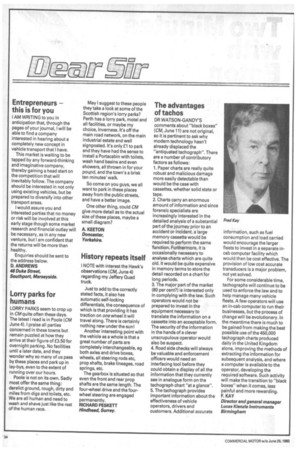am I T 0171
Page 36

If you've noticed an error in this article please click here to report it so we can fix it.
Entrepreneurs — this is for you
I AM WRITING to you in anticipation that, through the pages of your journal, twill be able to find a company interested in hearing about a completely new concept in vehicle transport that I have.
This market is waiting to be tapped by any forward-thinking and imaginative company, thereby gaining a head start on the competition that will inevitably follow. The company should be interested in not only using existing vehicles, but be prepared to diversify into other transport areas.
I would assure you and interested parties that no money or risk will be involved at this early stage though some market research and financial outlay will be necessary, as in any new venture, but I am confident that the returns will be more than healthy.
Enquiries should be sent to the address below.
D. ANDREWS 46 Duke Street, Southport, Merseyside.
Lorry parks for humans
LORRY PARKS seem to crop up in CMquite often these days. The latest tread is in Poole (CM June 4). I praise all parties concerned in these towns but remain puzzled at how they arrive at their figure of £3.50 for overnight parking. No facilities until a later date, and they wonder why so many of us pass by these places and park up in lay-bys, even to the extent of running over our hours.
Poole is not on its own. Sadly most offer the same thing: derelict ground, rough, dirty and miles from digs and toilets, etc. We are all human and need to wash and shave just like the rest of the human race. May I suggest to these people they take a look at some of the Scottish region's lorry parks? Perth has a lorry park, motel and all facilities, or maybe my choice, Inverness. It's off the main road network, on the main industrial estate and well signposted. It's only £1 to park and they have had the sense to install a Portacabin with toilets, wash hand basins and even showers, all thrown in for your pound, and the town's a brisk ten minutes' walk.
So come on you guys, we all want to park in these places away from the public streets, and have a better image.
One other thing, could CM give more detail as to the actual size of these places, maybe a small diagram?
A. KEETON Doncaster, Yorkshire.
History repeats itself
I NOTE with interest the Hawk's observations (CM, June 4) regarding my Jeffery Quad truck.
Just to add to the correctly stated facts, it also has automatic self-locking differentials, the consequence of which is that providing it has traction on one wheel it will travel along. There is certainly nothing new under the sun!
Another interesting point with the vehicle as a whole is that a great number of parts are completely interchangeable, eg both axles and drive boxes, wheels, all steering rods etc, prop shafts, brake lineages, road springs, etc.
The gearbox is situated so that even the front and rear prop shafts are the same length. The four-wheel drive and the fourwheel steering are engaged permanently.
RICHARD PESKETT Hindhead, Surrey.
The advantages of tachos
DR WATSON-GANDY'S comments about "black boxes" (CM, June 11) are not original, so it is pertinent to ask why modern technology hasn't already displaced the "antiquated tachograph". There are a number of contributory factors as follows: '1. Paper charts are really quite robust and malicious damage more easily detectable than would be the case with cassettes, whether solid state or tape.
2. Charts carry an enormous amount of information and since forensic specialists are increasingly interested in the detailed analysis of a substantial part of the journey prior to an accident or incident, a large memory cassette would be required to perform the same function. Furthermore, it is occasionally necessary to analyse charts which are quite old. It would be quite expensive in memory terms to store the detail recorded on a chart for long periods.
3. The major part of the market (80 per cent?) is interested only in complying with the law. Such operators would not be prepared to invest in the equipment necessary to translate the information on a cassette into an acceptable form. The security of the information in the hands of a clever unscrupulous operator would also be suspect.
4. Road side checks will always be valuable and enforcement officers would need an interfacing tool before they could obtain a display of all the information that they currently see in analogue form on the tachograph chart "at a glance".
5. The tachograph provides important information about the effectiveness of vehicle operators, drivers and customers. Additional accurate
information, such as fuel consumption and load carried would encourage the larger fleets to invest in a separate incab computer facility which would then be cost effective. The provision of low cost accurate transducers is a major problem, not yet solved.
For some considerable time, tachographs will continue to be used to enforce the law and to help manage many vehicle fleets. A few operators will use an in-cab computer to run their businesses, but the process of change will be evolutionary. In the meantime there is much to be gained from making the best possible use of the 450,000 tachograph charts produced daily in the United Kingdom alone, improving the methods of extracting the information for subsequent analysis, and where a computer is available to the operator, developing the required software. Such activity will make the transition to "black boxes" when it comes, less painful and more rewarding. F. KAY
Director and general manager Lucas Kienzle Instruments Birmingham








































































































